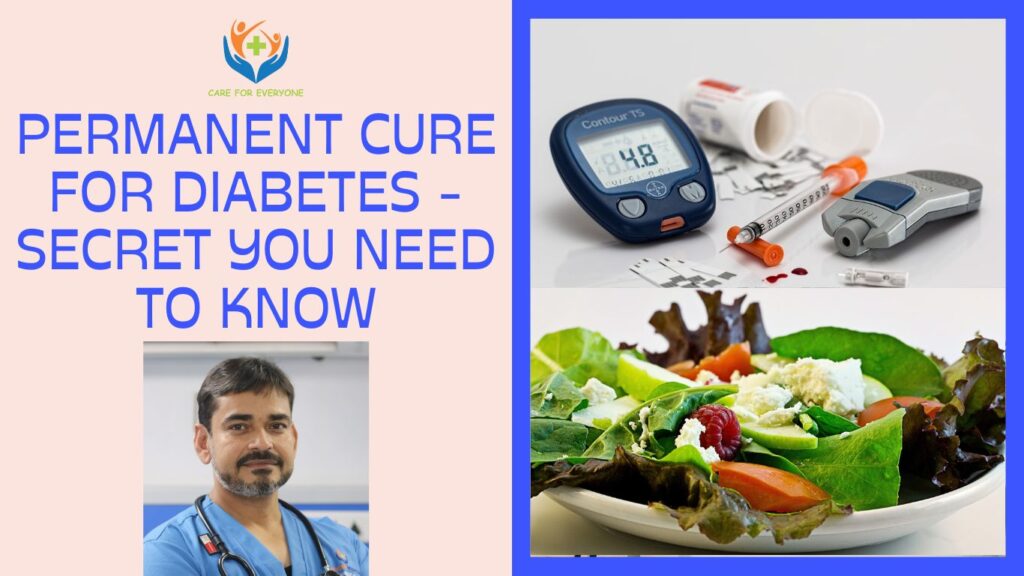Launching the best Weight loss and Diabetes reversal programme
What is Diabetes Reversal (Remission) : Understanding the Process and Benefits
Diabetes reversal is a term that refers to the ability to effectively manage and even eliminate the symptoms of diabetes by adopting a healthy lifestyle and addressing the root causes of the condition. It involves going in the opposite direction of the disease, leading to a reduction in blood sugar levels, decreased reliance on insulin or medications, weight loss, improved muscle tone, a more youthful appearance, and overall fitness comparable to someone 10 to 20 years younger. In this article, we will delve into the concept of Diabetes reversal programme, explore the truth behind it, and provide valuable insights for individuals looking to reverse their diabetes.
Introduction
Diabetes is a chronic condition that affects millions of people worldwide. It is characterized by high blood sugar levels due to the body’s inability to produce or effectively use insulin, a hormone responsible for regulating blood sugar. Traditionally, diabetes has been managed through medications, insulin injections, and dietary restrictions. However, there is growing evidence and an increasing number of success stories that highlight the possibility of reversing diabetes through lifestyle changes and addressing the root cause of the condition: insulin resistance.
Understanding Diabetes reversal programme: A New Direction

Diabetes reversal programme involves a comprehensive approach to address the underlying factors contributing to the development and progression of the disease. It requires individuals to stop doing the wrong things and start doing the right things to activate their body’s natural healing mechanisms. By making significant changes to their diet, exercise routine, stress management techniques, and overall lifestyle, individuals can experience a profound shift in their diabetes status.
The Truths of Weight loss and Diabetes reversal programme
1. Reversal Happens by Addressing the Root Cause: Insulin Resistance
Insulin resistance is a metabolic disorder characterized by the impaired ability of cells to respond to insulin, leading to elevated blood glucose levels. It is a key factor in the development of type 2 diabetes mellitus and is associated with various other conditions such as obesity, metabolic syndrome, and cardiovascular disease. Understanding the mechanisms underlying insulin resistance is crucial for developing effective therapeutic strategies to manage this condition.
Mechanisms of Insulin Resistance: Insulin resistance arises due to a complex interplay between genetic, environmental, and lifestyle factors :
- Adipose Tissue Dysfunction: Increased adipose tissue mass, particularly in the visceral region, leads to the release of pro-inflammatory adipokines and cytokines, which disrupt insulin signaling pathways in target tissues.
- Inflammation: Chronic low-grade inflammation, characterized by increased levels of pro-inflammatory cytokines, impairs insulin signaling and promotes insulin resistance.
- Lipotoxicity: Elevated levels of free fatty acids in circulation can accumulate in non-adipose tissues such as liver, muscle, and pancreas. This lipid deposition leads to cellular dysfunction and insulin resistance.
- Mitochondrial Dysfunction: Impaired mitochondrial function in insulin-sensitive tissues results in decreased ATP production, oxidative stress, and altered insulin signaling.
- Insulin Signaling Pathway Defects: Dysregulation of key components in the insulin signaling pathway, including insulin receptor substrate (IRS) proteins, protein kinase B (Akt), and glucose transporter 4 (GLUT4), can disrupt insulin action.
- Genetic Factors: Genetic variants in genes involved in insulin signaling, glucose metabolism, and adipokine production can contribute to insulin resistance susceptibility.
2. Reversal is a PROCESS
Diabetes reversal is not an overnight event but a gradual process. It comprises several phases, and it takes time to achieve sustainable results.
Phase 1: Adjustment –
In this phase, the person needs to adjust their mindset and understand that reversal is possible. It may take around 4 to 6 weeks to realize that positive changes are attainable.
Phase 2: Acceleration –
Intermittent fasting and cleansing the body play a crucial role in this phase, which typically lasts 8 to 12 weeks. By shedding excess fat, the body starts to accelerate the reversal process.
Phase 3: Inner Transformation –
Muscle building, adopting a positive mindset, stress relief techniques, and making dietary changes are the focus of this phase. It’s a transformative stage that lasts several weeks.
Phase 4: Becoming Independent –
Once the reversal is achieved, the person becomes independent and knowledgeable about maintaining their health. This phase may take six months to a year.
3. Ups and Downs: Navigating the Journey of Reversal
During the process of diabetes reversal, individuals may experience fluctuations in their blood sugar levels. These variations can be influenced by various factors, including illness, individual health conditions, and other external factors. It is essential to recognize that these ups and downs are a natural part of the journey and should not discourage individuals from their ultimate goal of reversal.
4. Accelerating Reversal by Addressing Individual Specific Problems
Inflammation and infection –
Individuals embarking on the path of diabetes reversal may encounter specific challenges unique to their health conditions. Addressing these individual-specific problems can significantly accelerate the reversal process. By tackling these specific problems head-on, we can greatly expedite the process of reversing diabetes. Inflammation and infections, such as gum and teeth infections or urinary tract infections, as well as irregular sleep patterns, can also have a notable impact on blood sugar levels. Therefore, it becomes essential to address these factors as part of the comprehensive approach to achieving optimal results in diabetes reversal.
Nutritional deficiencies
When embarking on the journey of weight loss and reversal, it is not uncommon to encounter roadblocks along the way. Despite putting in the effort, some individuals find themselves stuck in the middle without seeing the desired results. In such cases, it becomes crucial to identify and address specific nutritional deficiencies that may vary from person to person. Deficiencies in nutrients like iron, B12, vitamin D, and others can hinder progress and impede the achievement of desired goals.
Understanding the Importance of Nutritional Deficiencies
Iron Deficiency: Unlocking the Energy Reserves
Iron is an essential mineral that plays a crucial role in the production of hemoglobin, a protein responsible for carrying oxygen throughout the body. When an individual lacks sufficient iron, their energy levels can plummet, making it harder to engage in physical activities and maintain a healthy weight. To address iron deficiency, incorporating iron-rich foods such as lean meats, spinach, and legumes into the diet can help boost energy levels and support weight loss efforts.
B12 Deficiency: Enhancing Metabolism and Energy
Vitamin B12 is vital for maintaining a healthy metabolism and energy production. When the body lacks this essential nutrient, it can lead to fatigue, weakness, and hindered weight loss progress. Increasing the intake of foods rich in vitamin B12, such as seafood, dairy products, and fortified cereals, can help address the deficiency and promote an active metabolism, aiding in weight loss and reversal.
Vitamin D Deficiency: Regulating Weight and Reversal
Vitamin D plays a crucial role in several bodily functions, including bone health, immune system regulation, and weight management. Inadequate levels of vitamin D can lead to weight gain, decreased muscle strength, and hindered reversal progress. Exposure to sunlight, consuming fatty fish like salmon, and incorporating fortified dairy products into the diet can help address vitamin D deficiency and support weight loss and reversal goals.
Other Nutritional Deficiencies: A Comprehensive Approach
Apart from iron, B12, and vitamin D deficiencies, there are several other nutrients that can impact weight loss and reversal efforts. These include essential minerals like zinc, magnesium, and selenium, as well as vitamins like vitamin C and vitamin E. Incorporating a diverse range of fruits, vegetables, whole grains, and lean proteins can help ensure an adequate intake of these vital nutrients, addressing deficiencies and supporting overall health and well-being.
Hormonal imbalance
Weight loss is a complex journey influenced by various factors, and one crucial aspect that often goes unnoticed is the role of hormonal imbalance. Hormones such as thyroid hormones, leptin, testosterone in males, and estrogen/progesterone in females (particularly after surgeries) play a significant role in regulating our metabolism and body composition. In this article, we will explore the intricate relationship between hormonal imbalances and their impact on weight loss, shedding light on how these imbalances can affect our efforts to achieve a healthier body.
- Unveiling the Thyroid’s InfluenceThe thyroid gland, located in the neck, is responsible for producing thyroid hormones that regulate our metabolism. When the thyroid gland produces insufficient amounts of these hormones, a condition known as hypothyroidism, it can lead to weight gain and difficulty in losing weight. On the other hand, an overactive thyroid, known as hyperthyroidism, can lead to weight loss despite increased appetite. Understanding the delicate balance of thyroid hormones is essential for effective weight management.
- Leptin’s Role in Weight RegulationLeptin, often referred to as the “satiety hormone,” is produced by fat cells and plays a vital role in regulating appetite and energy expenditure. However, when leptin levels become imbalanced, typically due to excess body fat, a condition called leptin resistance can develop. Leptin resistance disrupts the body’s ability to recognize and respond to the hormone’s signals, leading to increased food intake and decreased energy expenditure. This imbalance can contribute to weight gain and hinder weight loss efforts.
- Testosterone in MalesIn males, testosterone plays a crucial role in maintaining muscle mass, regulating fat distribution, and influencing metabolism. Low testosterone levels can lead to decreased muscle mass, reduced metabolic rate, and increased fat accumulation, making it challenging to achieve weight loss goals. Addressing hormonal imbalances in males, especially related to testosterone, is essential for optimizing weight loss outcomes.
- Estrogen and Progesterone in Females, especially after SurgeriesIn females, estrogen and progesterone have a significant impact on weight regulation. Fluctuations in these hormones, particularly after surgeries such as hysterectomy or menopause, can lead to weight gain and difficulty in losing weight. Hormonal imbalances during these transitional periods can affect metabolism, appetite, and fat storage, making weight loss more challenging. Understanding the interplay of estrogen and progesterone is crucial for tailoring effective weight management strategies in women.
- Too thin/too obese
Being either too thin or too obese can indeed have an impact on the reversal of diabetes, as both extremes can contribute to insulin resistance and difficulties in achieving metabolic balance.
It is important to note that regardless of weight, lifestyle modifications such as adopting a healthy diet, engaging in regular physical activity, managing stress, and getting adequate sleep can play a crucial role in diabetes reversal. However, individuals at both ends of the weight spectrum may require additional support and tailored strategies to address their specific challenges and achieve their health goals.
Complications related to kidneys, liver, heart, nerves, etc.
Complications related to kidneys, liver, heart, nerves, etc., such as chronic kidney disease (CKD) and fatty liver disease, can indeed pose challenges to the reversal of diabetes. These complications often occur due to long-standing diabetes and can contribute to insulin resistance, making it harder for the body to respond to interventions aimed at reversing diabetes.
In the case of CKD, impaired kidney function can lead to difficulties in managing blood sugar levels and maintaining overall metabolic balance. Additionally, CKD can affect the clearance of certain medications used to treat diabetes, making it more challenging to achieve optimal control.
Fatty liver disease, specifically non-alcoholic fatty liver disease (NAFLD), is closely associated with insulin resistance and metabolic syndrome, both of which are risk factors for type 2 diabetes. As the liver plays a crucial role in regulating blood sugar levels, the presence of fatty liver disease can interfere with insulin action and contribute to elevated blood sugar levels.
Heart complications, such as coronary artery disease and heart failure, can also impact diabetes reversal efforts. These conditions often coexist with diabetes and can worsen insulin resistance, impair glucose metabolism, and increase the risk of cardiovascular events.
Nerve damage, known as diabetic neuropathy, can further complicate diabetes management. It can lead to symptoms such as pain, numbness, and tingling in the extremities, affecting mobility and quality of life. Diabetic neuropathy can make exercise and physical activity more challenging, which are crucial components of diabetes reversal strategies.
Overall, the presence of complications related to the kidneys, liver, heart, nerves, and other organs can contribute to the resistance of the body to change and complicate efforts to reverse diabetes. It highlights the importance of comprehensive medical care and a multidisciplinary approach to address these underlying conditions in conjunction with diabetes management.
Exercise limitations, preferences and mental blocks
Exercise limitations, preferences, and mental blocks can indeed have an impact on diabetes reversal, especially when the body is resistant to change due to age and physical limitations such as frozen shoulders. Additionally, the fear or discomfort of exercising alone can act as a mental block, further hindering progress. It is important to address these factors to develop a suitable exercise routine that accommodates individual needs and preferences.
- Physical limitations, such as frozen shoulders, can restrict the range of motion and make certain exercises challenging or painful. In such cases, it is advisable to consult with a healthcare professional or physical therapist who can provide guidance on exercises that are safe and appropriate for the condition. They may recommend activities like swimming or cycling, which are low-impact and put less strain on the affected joints.
- Preferences also play a crucial role in sustaining an exercise routine. Some individuals may find certain activities more enjoyable and engaging, increasing their motivation to stick with the program. If someone prefers swimming, for example, incorporating regular swimming sessions into their exercise plan can help maintain their interest and consistency.
- Addressing mental blocks is equally important. Some individuals may feel anxious or uncomfortable exercising alone, which can demotivate them or make it harder to adhere to a routine. In such cases, finding a workout buddy or joining group exercise classes can provide a sense of support and encouragement. Working out with others can make the experience more enjoyable and foster a sense of camaraderie, potentially overcoming the mental block of exercising alone.
- To successfully reverse diabetes, it is essential to tailor the exercise regimen to individual capabilities, limitations, and preferences. This may involve incorporating low-impact activities, addressing physical limitations through professional guidance, and finding ways to overcome mental blocks. By adapting the exercise routine to these factors, individuals can enhance their chances of achieving positive outcomes in their diabetes management journey
Emotional and motivational
Emotional and motivational factors can have a significant impact on various aspects of health, including weight management and diabetes reversal. Stressful eating, emotional issues, and resistance to change can all influence the success of weight loss efforts and the ability to reverse diabetes.
- Stressful eating refers to the tendency to consume food as a coping mechanism for dealing with emotional distress or pressure. When faced with stress, some individuals may turn to food for comfort or as a way to distract themselves from their emotional issues. This can lead to overeating or consuming unhealthy foods, which can hinder weight loss and negatively affect diabetes management.
- Emotional issues, such as depression, anxiety, or low self-esteem, can also play a role in weight gain and difficulty in sustaining healthy habits. Emotional distress may trigger emotional eating, making it challenging to adhere to a balanced diet or maintain a consistent exercise routine. Additionally, emotional issues can contribute to a negative mindset, making it harder to stay motivated and committed to lifestyle changes necessary for diabetes reversal.
- Resistance to change is another factor that can impede progress in weight loss and diabetes reversal. Changing established habits and adopting new behaviors requires effort and determination. Some individuals may find it difficult to break away from their old routines, even if they understand the benefits of weight loss and improved diabetes control. This resistance to change can stem from fear, uncertainty, or a lack of self-belief, which can hinder progress in achieving health goals.
- Addressing emotional and motivational factors is crucial when striving for weight loss and diabetes reversal. Building a strong support system, including healthcare professionals, family, and friends, can provide guidance, encouragement, and accountability. Seeking therapy or counseling to address emotional issues can help develop healthier coping mechanisms and improve mental well-being. Additionally, setting realistic goals, celebrating small achievements, and finding enjoyable forms of exercise can enhance motivation and make the journey more sustainable.
- Ultimately, it is important to recognize the multifaceted nature of weight loss and diabetes reversal. By addressing emotional and motivational factors alongside adopting a healthy lifestyle, individuals can increase their chances of success in achieving and maintaining their health goals.
5. Overcoming Inertia: The Biggest Enemy of Diabetes reversal programme
In the journey to reverse diabetes, overcoming inertia is essential as it can be the biggest obstacle to progress. Inertia is often formed by our ingrained habits, our tendency to stay within comfort zones, limited thinking patterns, and our reluctance to take action. To successfully reverse diabetes, it is crucial to break free from these limitations and embrace change.
Stepping out of our comfort zones is a necessary step in overcoming inertia. It requires a willingness to venture into unfamiliar territory, explore new approaches, and be open to trying different strategies. Change can be uncomfortable, but it is through this discomfort that we grow and make progress.
Challenging our limited beliefs is another important aspect of overcoming inertia. Often, we hold onto beliefs that restrict us from seeing the possibilities for improvement. By questioning and challenging these beliefs, we can broaden our perspective and open ourselves up to new ideas and solutions.
Taking proactive steps toward adopting a healthier lifestyle is vital in combating inertia. It involves setting goals, creating a plan, and consistently taking action. It may include making dietary changes, engaging in regular physical activity, managing stress, and seeking support from healthcare professionals or diabetes management programs. Each small step taken contributes to breaking the inertia and moving towards diabetes reversal.
Accepting the status quo and going with the flow can hinder progress in reversing diabetes. It is important to recognize that change requires effort and commitment. By actively challenging the inertia, we empower ourselves to make lasting changes and achieve the desired results.
In summary, overcoming inertia is crucial in the journey to reverse diabetes. It involves stepping out of our comfort zones, challenging limited beliefs, and taking proactive steps toward adopting a healthier lifestyle. By breaking free from inertia, we can pave the way for lasting change and improved well-being.
6.The Power of FOOD for weight loss
Using food as a tool for weight loss and diabetes reversal is a powerful approach that can greatly benefit individuals seeking to improve their health. By making mindful and informed choices about what we eat, we can harness the healing properties of food and achieve positive results.
Here are some key strategies to consider when using food as medicine for weight loss and diabetes reversal:
- Focus on whole, unprocessed foods: Prioritize fresh fruits and vegetables, whole grains, lean proteins, and healthy fats. These nutrient-dense foods provide essential vitamins, minerals, and fiber while minimizing added sugars, unhealthy fats, and artificial ingredients.
- Incorporate high-fiber foods: Including high-fiber foods such as legumes, whole grains, and vegetables can help regulate blood sugar levels, improve satiety, and support weight loss efforts. Fiber slows down digestion, promoting a gradual release of glucose into the bloodstream, which can prevent blood sugar spikes.
- Choose low-glycemic index foods: Foods with a low glycemic index (GI) have a slower impact on blood sugar levels. Examples include non-starchy vegetables, whole grains, nuts, and seeds. These foods can help stabilize blood sugar, reduce insulin resistance, and aid in weight management.
- Control portion sizes: Paying attention to portion sizes is crucial for weight management and blood sugar control. While healthy foods are beneficial, excessive consumption can still lead to weight gain. Balancing portion sizes and listening to your body’s hunger and fullness cues are key.
- Limit added sugars and refined carbohydrates: Foods high in added sugars and refined carbohydrates, such as sugary drinks, sweets, white bread, and pastries, can rapidly raise blood sugar levels. Minimizing their intake can improve insulin sensitivity and support weight loss.
- Emphasize lean proteins: Incorporating lean sources of protein, such as skinless poultry, fish, tofu, beans, and lentils, can help promote satiety, maintain muscle mass, and support weight loss. Protein also has a minimal impact on blood sugar levels compared to carbohydrates.
- Stay hydrated: Drinking enough water is essential for overall health and weight management. Water helps maintain proper hydration, supports digestion, and can help control appetite.
- Seek professional guidance: If you have diabetes or specific weight loss goals, it’s important to consult a healthcare professional, such as a registered dietitian or a doctor, who can provide personalized guidance and support based on your individual needs.
Using Food as Medicine
Remember, using food as medicine is a holistic approach that should be combined with regular physical activity, stress management, and adequate sleep to achieve optimal results. It’s important to make sustainable lifestyle changes and maintain a balanced approach to ensure long-term success in weight loss and diabetes management.
Joining support groups, participating in structured programs, and consulting with healthcare professionals who specialize in diabetes reversal can provide valuable guidance, motivation, and accountability. A structured and systematic approach tailored to individual needs yields the greatest results.
7. Experiencing the Joy of Reversal: Motivation to Continue
Experiencing the joy of reversal, such as successfully reversing the effects of diabetes, brings about a profound sense of motivation to continue on the path of wellness. The positive outcomes that accompany reversal, like weight loss and an overall improvement in well-being, have a significant impact not only on physical health but also on emotional happiness.
When someone witnesses the positive changes in their body and experiences the benefits of a healthier lifestyle, it creates a deep sense of joy and accomplishment. The newfound happiness and fulfillment serve as powerful drivers to maintain the progress achieved and continue living a healthy life.
The physical transformation, such as shedding excess weight and feeling more energetic, can be a source of immense satisfaction. These changes not only improve one’s physical appearance but also contribute to an increased self-esteem and a positive body image. Feeling more confident and comfortable in one’s own skin further enhances the motivation to sustain a healthy lifestyle.
Additionally, the overall improvement in well-being that comes with reversal cannot be overlooked. Managing diabetes and adopting a healthier lifestyle often leads to better control of blood sugar levels, reduced risk of complications, and improved cardiovascular health. These positive health outcomes contribute to a sense of peace and contentment, knowing that one is taking charge of their health and reducing the potential impact of diabetes-related complications.
Furthermore, the emotional well-being that accompanies successful reversal plays a significant role in motivation. Reversing diabetes can alleviate the stress, anxiety, and worry associated with the condition. The newfound freedom from constantly monitoring blood sugar levels and the fear of complications can bring about a profound sense of relief and peace of mind.
Experiencing the joy of reversal can also inspire others who may be struggling with similar health challenges. Sharing the success story and serving as a source of inspiration can be incredibly fulfilling and further reinforce one’s motivation to maintain a healthy lifestyle.
In conclusion, the joy, satisfaction, and overall well-being that result from successfully reversing the effects of diabetes serve as powerful motivators to continue living a healthy lifestyle. The physical and emotional transformations, along with the sense of accomplishment and happiness, create a positive feedback loop that reinforces the commitment to wellness. By embracing these positive changes and sustaining healthy habits, individuals can continue to enjoy the benefits of reversal and live a vibrant and fulfilling life.
Conclusion
Diabetes reversal programme is a transformative journey that involves addressing the root causes of the condition and adopting a comprehensive approach to lifestyle changes. It is a process that requires time, effort, and a commitment to making significant adjustments to diet, exercise, stress management, and overall well-being. By understanding the truths of diabetes reversal and overcoming challenges along the way, individuals can achieve a healthier, more fulfilling life. Remember, seeking guidance from experts and embracing the power of group energy can significantly enhance the chances of successful reversal.
FAQs
Can Diabetes reversal programme be achieved by solely relying on medications?
Medications can play a role in managing diabetes, but they are not sufficient for achieving reversal. Diabetes reversal requires a holistic approach that addresses the root causes of the condition and focuses on lifestyle changes, including diet, exercise, stress management, and overall well-being.
How long does it take to reverse diabetes?
The duration of the diabetes reversal process can vary from person to person. It typically takes at least 6 months to a year to achieve significant results. However, it is important to note that reversal is a lifelong commitment to maintaining a healthy lifestyle to prevent the recurrence of diabetes symptoms.
Can Diabetes reversal programme lead to a complete cure?
While diabetes reversal can significantly improve blood sugar control and reduce or eliminate the need for medications, it does not guarantee a complete cure. It is crucial to continue practicing healthy habits and monitoring blood sugar levels to prevent relapse.
Can stress management techniques contribute to diabetes reversal?
Yes, stress management techniques play a vital role in Diabetes reversal programme. Chronic stress can contribute to insulin resistance and worsen diabetes symptoms. By incorporating stress-relief practices such as meditation, yoga, or engaging in hobbies, individuals can effectively manage stress and support the reversal process.
Is it possible to reverse diabetes without exercise?
Exercise is an essential component of diabetes reversal. Regular physical activity helps improve insulin sensitivity, aids in weight loss, and contributes to overall well-being. While the type and intensity of exercise may vary depending on individual circumstances and limitations, incorporating some form of physical activity is highly recommended for successful reversal.
Please read the diabetes reversal movement being done all over the world.
Weight loss can put type 2 diabetes into remission for at least 5 years, direct study reveals
Discover the latest breakthroughs and cutting-edge scientific findings emerging every day. Prepare to be captivated by the intriguing discussion taking place among medical professionals as they consider reclassifying Type 2 Diabetes as a Metabolic Disorder.
Considering that lifestyle plays a significant role in the development of metabolic disorders, it’s crucial to acknowledge that a staggering 70% of diseases stem primarily from poor dietary and lifestyle choices.
Embrace the opportunity to embark on your transformative weight loss journey right now. This is not some far-fetched notion but an attainable reality within your grasp.
Please see the Video below of Dr V Mohan (Leading Diabetologist of India) on Remission of diabetes type 2
Start your weight loss & Remission of Type 2 Diabetes journey today. This is absolutely real and achievable!
Please contact Dr Sandeep Ojha for further details and consultation




